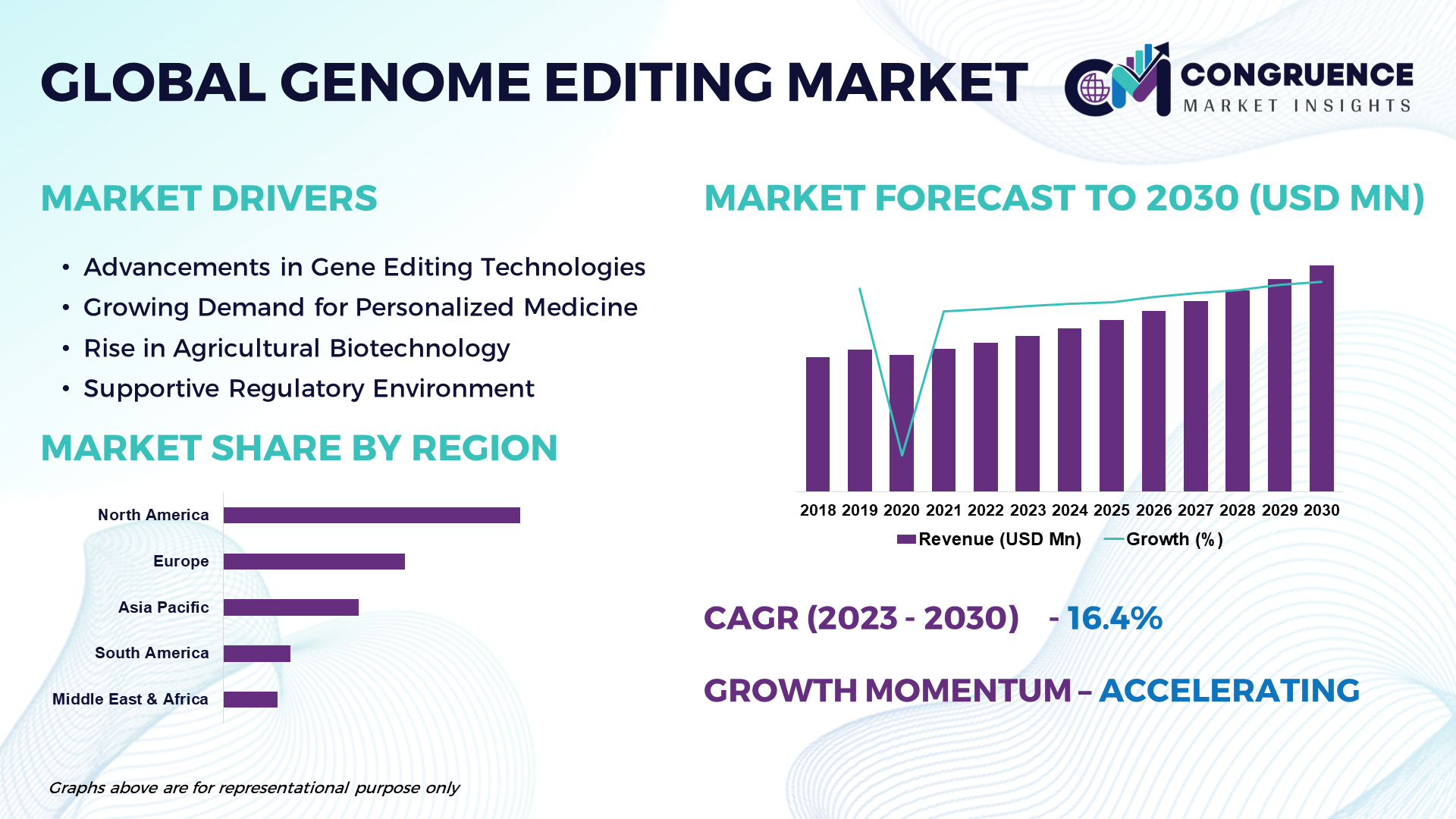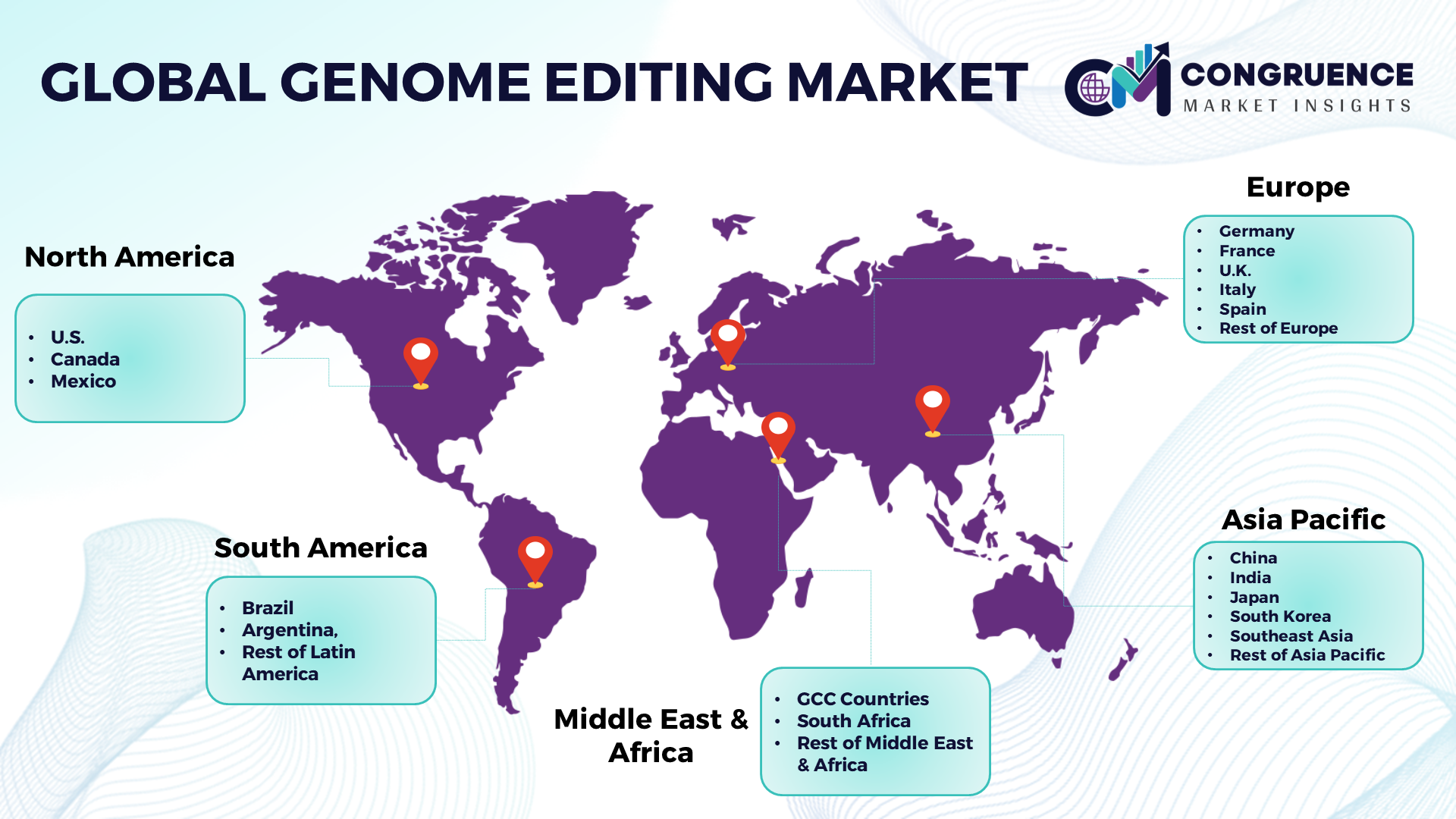Reports
The Global Genome Editing Market is projected to expand at a remarkable CAGR of 16.4% during the forecast period from 2023 to 2030. Genome editing, a revolutionary technology, allows scientists to modify an organism's DNA with precision, offering unprecedented potential for applications in various fields including biomedicine, agriculture, and industry. The market for genome editing is experiencing rapid growth driven by advancements in gene editing technologies, increasing research activities, and rising demand for personalized medicine. Key genome editing technologies such as CRISPR/Cas9, TALENs, and ZFNs are witnessing significant adoption across diverse applications ranging from gene therapy to crop improvement. The market is propelled by the growing investment in genomics research, supportive government initiatives, and the increasing prevalence of genetic disorders.

Genome Editing Market Major Driving Forces
Advancements in Gene Editing Technologies: Rapid advancements in genome editing technologies, particularly CRISPR/Cas9, have revolutionized the field of molecular biology, enabling precise and efficient editing of DNA sequences. The continuous evolution of gene editing tools and techniques drives market growth by expanding the scope of applications across various industries.
Growing Demand for Personalized Medicine: The increasing prevalence of genetic disorders and the growing demand for personalized medicine solutions drive the adoption of genome editing technologies in the healthcare sector. Genome editing holds immense potential for developing targeted therapies and precision medicine approaches, fueling market growth.
Rise in Agricultural Biotechnology: Genome editing technologies play a crucial role in agricultural biotechnology by enabling the development of genetically modified crops with desirable traits such as increased yield, pest resistance, and nutritional value. The growing global population and food security concerns drive the adoption of genome editing in agriculture, contributing to market growth.
Supportive Regulatory Environment: Favorable regulatory policies and initiatives supporting genome editing research and applications accelerate market growth by fostering innovation and investment in the field. Regulatory frameworks that prioritize safety, ethical considerations, and responsible use of genome editing technologies provide a conducive environment for market expansion.
Genome Editing Market Key Opportunities
Expansion in Therapeutic Applications: The expanding application of genome editing technologies in therapeutic areas presents significant growth opportunities for the market. Genome editing holds promise for developing novel gene therapies, treating genetic disorders, and combating various diseases such as cancer, cardiovascular disorders, and infectious diseases.
Agricultural Innovation and Sustainability: Genome editing offers immense potential for driving innovation and sustainability in agriculture by developing crops with improved traits such as drought tolerance, disease resistance, and nutritional content. The adoption of genome-edited crops can address global challenges related to food security, climate change, and sustainable agriculture, presenting lucrative opportunities for market players.
Emerging Industrial Applications: Genome editing technologies find diverse industrial applications beyond healthcare and agriculture, including biofuel production, industrial enzyme engineering, and bioprocessing. The integration of genome editing with industrial biotechnology presents opportunities for optimizing microbial strains, improving fermentation processes, and developing sustainable biomanufacturing solutions.
Genome Editing Market Key Trends
· CRISPR/Cas9 Dominance: CRISPR/Cas9 technology continues to dominate the genome editing market due to its simplicity, efficiency, and versatility in editing DNA sequences across various organisms. Ongoing advancements in CRISPR-based tools and applications drive market growth and adoption in biomedical research, drug discovery, and agricultural biotechnology.
· Expansion of Therapeutic Genome Editing: Therapeutic genome editing is witnessing rapid expansion with the development of novel gene editing therapies for treating genetic disorders, inherited diseases, and cancer. The translation of genome editing technologies from preclinical research to clinical applications marks a significant trend in the healthcare sector, driving market growth and investment in therapeutic genome editing.
· Precision Agriculture Adoption: Precision agriculture adoption is accelerating with the integration of genome editing technologies for developing genetically modified crops with enhanced traits such as yield improvement, disease resistance, and environmental stress tolerance. The application of genome editing in crop improvement and sustainable agriculture practices is a key trend driving market growth in the agricultural biotechnology sector.

Market Competition Landscape
The global genome editing market is characterized by intense competition among key market players striving to strengthen their market presence through strategic initiatives. Companies are focusing on research and development activities to introduce innovative genome editing tools, expand their product portfolios, and cater to diverse end-user applications. Key players in the genome editing market engage in partnerships, collaborations, and acquisitions to enhance their technological capabilities, geographic presence, and customer base. Prominent players in the global genome editing market include:
· CRISPR Therapeutics
· Editas Medicine
· Intellia Therapeutics
· Sangamo Therapeutics
· Thermo Fisher Scientific
· Lonza Group
· Merck KGaA
· Horizon Discovery Group
· Integrated DNA Technologies, Inc.
· New England Biolabs
· Precision Biosciences
· Cellectis
· GenScript Biotech Corporation
· Takara Bio Inc.
|
Report Attribute/Metric |
Details |
|
Base Year |
2022 |
|
Forecast Period |
2023 – 2030 |
|
Historical Data |
2018 to 2022 |
|
Forecast Unit |
Value (US$ Mn) |
|
Key Report Deliverable |
Revenue Forecast, Growth Trends, Market Dynamics, Segmental Overview, Regional and Country-wise Analysis, Competition Landscape |
|
Segments Covered |
· By Technology (CRISPR/Cas9, TALENs, ZFNs, Others) · By Application (Biomedical, Agricultural, Industrial) · By End-user (Pharmaceutical & Biotechnology Companies, Academic & Research Institutes, Contract Research Organizations) · By Sales Channel (Direct Sales, Distributor Sales) |
|
Geographies Covered |
North America: U.S., Canada and Mexico Europe: Germany, France, U.K., Italy, Spain, and Rest of Europe Asia Pacific: China, India, Japan, South Korea, Southeast Asia, and Rest of Asia Pacific South America: Brazil, Argentina, and Rest of Latin America Middle East & Africa: GCC Countries, South Africa, and Rest of Middle East & Africa |
|
Key Players Analyzed |
CRISPR Therapeutics, Editas Medicine, Intellia Therapeutics, Sangamo Therapeutics, Thermo Fisher Scientific, Lonza Group, Merck KGaA, Horizon Discovery Group, Integrated DNA Technologies, Inc., New England Biolabs, Precision Biosciences, Cellectis, GenScript Biotech Corporation, Takara Bio Inc. |
|
Customization & Pricing |
Available on Request (10% Customization is Free) |
